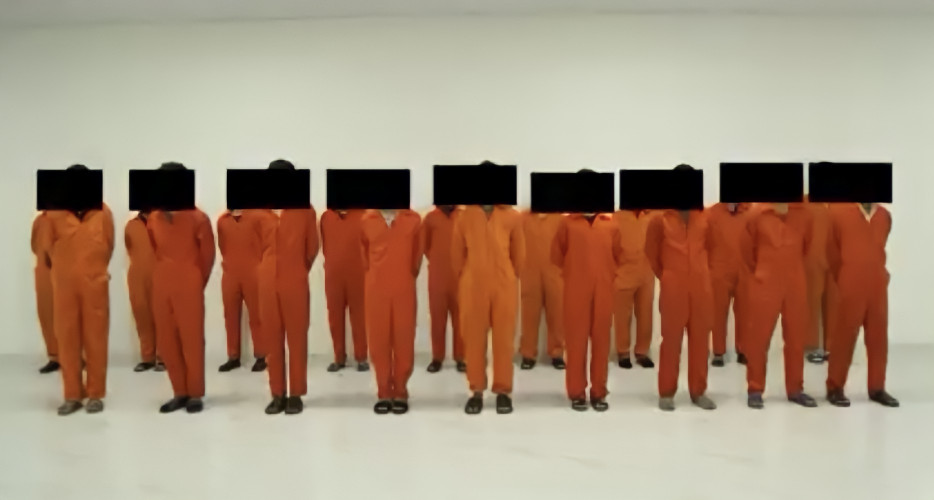
PEREGRAF– Hava Ghalib
The Kurdistan Regional Government’s (KRG) security forces were strongly criticised for publishing a video confession of several detainees accused of attacking public offices during last year’s protests in Sulaimaniyah province. Human rights workers, lawyers and experts said it is "illegal" and "inappropriate" to publicise these contents.
The Sulaimaniyah security directorate published a video on January 4 which showed about 18 young men from Piramagrun town in orange prison uniforms. They were allegedly detained for attacking and burning public offices and libraries during last year’s protests.
"Publishing photos of the accused before trial is not mentioned in the law, only when the accused have fled and do not turn themselves in, at which time security will publish it for recognition, but if the accused is under investigation, it is inappropriate to publish their photos," Saman Fawzi, a university teacher and law expert, told Peregraf.
Fawzi noted that the detainees can be recognised by their friends and families even if their faces are blurred and covered. "That is two punishments, one is if they are convicted and one additional punishment, which the law prohibits, is publishing their photographs," he said.
The Kurdistan Region saw a series of protests in November 2021, which were calling for the reinstatement of student allowances. They were met with force and violence and several government offices were set on fire in several towns and cities.
"These people have only been accused, what if they are proved innocent and released tomorrow, how will they be compensated?" Fawzi asked, adding that confessions are published for major terrorism incidents to create calm, not "for a minor incident" like that one.
"I hope that the media departments of security agencies are trained better on how to publish these videos because people did not expect these videos, this could have been done with legal procedures, not be broadcasted on TV," he noted.
Publishing videos and photos of detainees accused have become a norm in all of Kurdistan Region and Iraq’s security media platforms.
Erbil security last year published an "evidence and confession" video of several detained journalists and activists from Duhok province, which provoked the already-angry public who were critical of detaining the group. Their trial was also criticized by the United Nations and the international organizations over the "lack of clear evidence" with which the detainees were convicted.
One of their charges was the "misuse of communications devices" and defamation, an act the KRG is now criticized for doing.
Videos have been published on multiple other occasions without hiding faces, in some detainees were released shortly after, including in 2019 when several citizens were accused of shooting at a restaurant in which a Turkish diplomat was killed in Erbil.
"According to Iraq’s constitution and all laws, confession of the accused cannot be published before or after trial. According to the law, the detainee must be respected," Sami Sati, a lawyer, told Peregraf, adding that publishing them in the media without the consent and knowledge of the detainees or judiciary is "illegal."
The Kurdistan Region’s Independent Human Rights Commission said most of the detainees were released following the publication of the video, calling the act a "violation" of their rights.
"We see publishing video confession of detainees as a violation of their rights because they are only accused before trial," Suleiman Muhsin, director-general of the commission said. "For us, as a human rights group, taking confessions is only respected when done by the judge and we will respect the court's decision."
Muhsin added that according to his information "only three or four of them remain in prison and the others were released, while the confession of those who were released was published."
The security forces were further criticised for putting the young men in orange uniforms. The color of the uniform was argued to be for serious crimes, while others compared it to an act Islamic State (ISIS) was known for.
Muhsin said showing them "in the clothes that ISIS had previously put on our Peshmerga and beheaded them, showed an ugly side in the Kurdistan Region. Although the security forces in Sulaimaniyah say it is an international uniform for our prisoners, I don't know on what grounds that is international clothing. There is no uniform for prisoners in the Kurdistan Region."
The security directorate later in response to the criticism issued a clarification statement, on January 5 saying the uniform’s colour is "international."
Badriya Ismael, a rapporteur in the Social Affairs and Protection of Human Rights Committee in the Kurdistan Region parliament, said that an "orange uniform is for dangerous criminals, not a group of young people which is not clear whether they have done that or not."
Ismael said while she was against burning and attacking public institutions, the uniform and publication of the confession lacks "investigation confidentiality and is against the principles of human rights because you should not accuse one before the judiciary tries them, or publish investigations."
"According to the law, the voice, color, or full name should not be revealed, because these bring bad rumors after them," she said, noting that the detainees are legally "innocent until proven guilty."